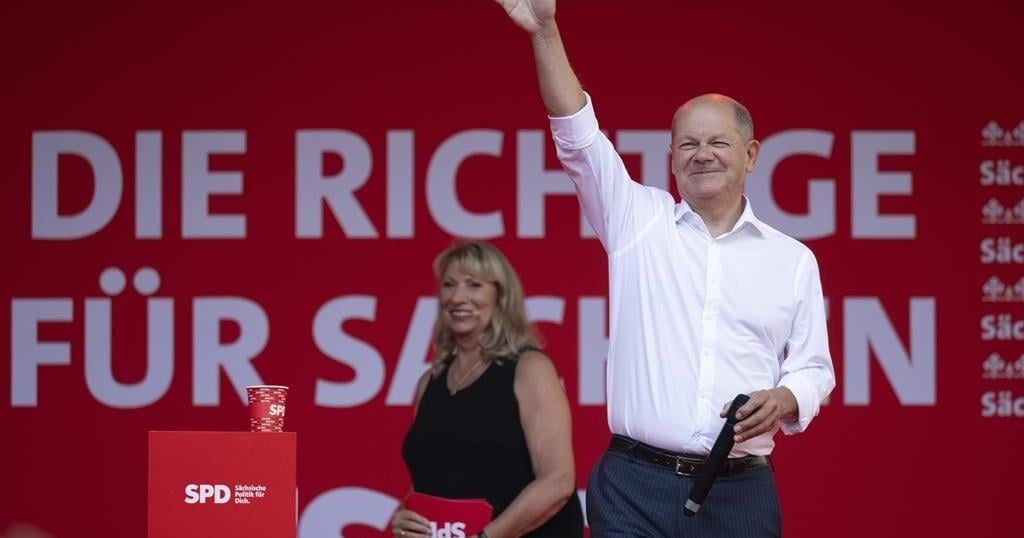BERLIN (AP) — A far-right party won a state election for the first time in post-World War II Germany in the country’s east on Sunday, and was set to finish at least a very close second to mainstream conservatives in a second vote.
A new party founded by a prominent leftist also made an immediate impact, while the parties in Chancellor Olaf Scholz’s unpopular national government obtained extremely weak results.
Projections for ARD and ZDF public television based on exit polls and partial counting showed the far-right Alternative for Germany, or AfD, winning 32-33% of the vote in Thuringia — well ahead of the center-right Christian Democratic Union, the main national opposition party, with about 24%.
In neighboring Saxony, projections put support for the CDU, which has led the state since German reunification in 1990, at 31.5-31.8% and AfD on 30.8-31.4%.
“An openly right-wing extremist party has become the strongest force in a state parliament for the first time since 1949, and that causes many people very deep concern and fear,” said Omid Nouripour, a leader of the Greens, one of the national governing parties.
Other parties say they won’t put AfD in power by joining it in a coalition. Even so, its strength is likely to make it extremely difficult to form new state governments, forcing other parties into exotic new coalitions. The new Sahra Wagenknecht Alliance, or BSW, took up to 16% of the vote in Thuringia and 12% in Saxony, adding another level of complication.
“This is a historic success for us,” Alice Weidel, a national co-leader of AfD, told ARD. She described the result as a “requiem” for Scholz’s coalition.
The CDU’s national general secretary, Carsten Linnemann, said that “voters in both states knew that we wouldn’t form a coalition with AfD, and it will stay that way — we are very, very clear on this.”
Weidel denounced that as “pure ignorance” and said that “voters want AfD to participate in a government.”
Deep discontent with a national government notorious for infighting, anti-immigration sentiment and skepticism toward German military aid for Ukraine are among the factors that have contributed to support for populist parties in the region, which is less prosperous than western Germany.
AfD is at its strongest in the formerly communist east, and the domestic intelligence agency has the party’s branches in both Saxony and Thuringia under official surveillance as “proven right-wing extremist” groups. Its leader in Thuringia, Björn Höcke, has been convicted of knowingly using a Nazi slogan at political events, but is appealing.
Höcke bristled when an ARD interviewer mentioned the intelligence agency’s assessment, responding: “Please stop stigmatizing me. We are the No. 1 party in Thuringia. You don’t want to classify one-third of the voters in Thuringia as right-wing extremist.”
He said he felt “a great, great deal of pride” in Sunday’s result for his 11-year-old party and “the old parties should show humility.”
Scholz’s center-left Social Democrats were at least set to remain in the two state legislatures with single-digit support, but the environmentalist Greens were set to lose their seats in Thuringia. The two parties were the junior coalition partners in both outgoing state governments. The third party in the national government, the pro-business Free Democrats, also lost its seats in Thuringia. It had no representation in Saxony.
A third state election follows Sept. 22 in another eastern state, Brandenburg, currently led by Scholz’s party. Germany’s next national election is due in a little over a year.
Thuringia’s politics are particularly complicated because the Left Party of outgoing governor Bodo Ramelow has slumped into electoral insignificance nationally. It lost nearly two-thirds of its support compared with five years ago, dropping to around 12%.
Sahra Wagenknecht, long one of its best-known figures, left last year to form her own party, which is now outperforming the Left. Wagenknecht celebrated that party’s success, underlined its refusal to work with AfD’s Höcke and said she hopes it can form “a good government” with the CDU.
The CDU has long refused to work with the Left Party, descended from East Germany’s ruling communists. It hasn’t ruled out working with Wagenknecht’s BSW, which will probably be needed to form any government without AfD at least in Thuringia. BSW is also at its strongest in the east.
AfD has tapped into high anti-immigration sentiment in the region. The Aug. 23 knife attack in the western city of Solingen in which a suspected extremist from Syria is accused of killing three people helped push the issue back to the top of Germany’s political agenda, and prompted Scholz’s government to announce new restrictions on knives and new measures to ease deportations.
Wagenknecht’s BSW combines left-wing economic policy with an immigration-skeptic agenda. The CDU has also stepped up pressure on the national government for a tougher stance on immigration.
Germany’s stance toward Russia’s war in Ukraine is also a sensitive issue in the east. Berlin is Ukraine’s second-biggest weapons supplier after the United States; those weapons deliveries are something both AfD and BSW oppose. Wagenknecht has also assailed a recent decision by the German government and the U.S. to begin deployments of long-range missiles to Germany in 2026.
